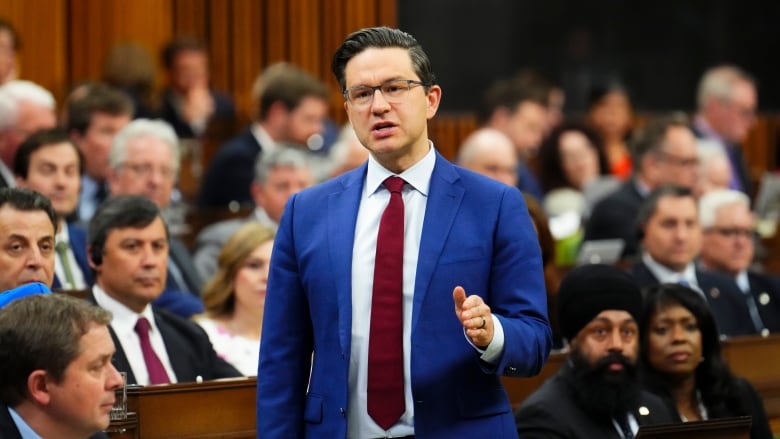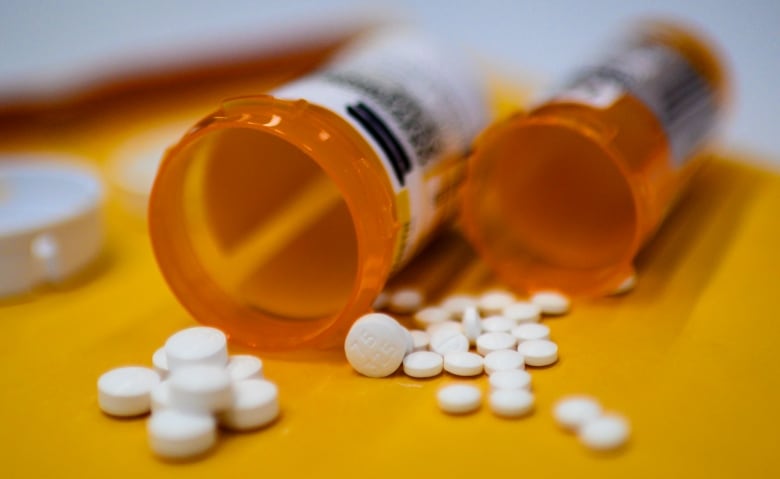Poilievre-backed motion calls for an end to safe drug policies and more cash for treatment
Conservative leader says government funded safe-supply programs are leading to more opioid deaths

UPDATE: The motion was defeated in the House of Commons, 209 votes to 113.
Conservative Leader Pierre Poilievre introduced a motion to the House of Commons Thursday calling on the Liberal government to halt all programs providing non-toxic drugs to those suffering from addictions and redirect funding to treatment services.
"Crime and chaos, drugs and disorder rage in our streets. Nowhere is this worse than in the opioid overdose crisis that has expanded so dramatically in the last several years," Poilievre told the House of Commons on Thursday morning.
The Conservative leader said Prime Minister Justin Trudeau, backed by "tax-funded" activists, big pharmaceutical companiesand others, is wrong to argue that providing addicted persons with "powerful heroin-like drugs that are uncontaminated" will steer them away from street drugs.
"We're told that giving out and decriminalizing hard drugs would reduce drug overdoses," Poilievre told the House. "These so-called experts are typically pie in the sky theorists with no experience getting people off drugs, or they're members of the misery industry those paid activists and public health bureaucrats whose jobs depend on the crisis continuing."
The Conservative leader said that government-funded drugs were being sold by the addicted and the proceeds are being used to buy fentanyl-laced opioids that lead to overdose deaths.
Poilievre's motion says that between 2016 and 2022 almost 35,000 people died from complications related to opioid overdoses in Canada, a number backed up by the federal government.
He calledon members of the House to vote in favour of asking the Liberal government "to immediately reverse its deadly policies and redirect all funds from taxpayer-funded, hard drug programs to addiction, treatment and recovery programs."
Toxic supply a factor in 4 of 5 overdose deaths
Poilievre told the House that because these deaths have taken place since Trudeau came to office, the prime minister could not dismiss them as an inherited problem.
According to the federal government's Health Infobase, where the 35,000 number can be found, the toxic supply of contaminated street drugs is "a major driver" of the opioid crisis.
"A total of 5,360 apparent opioid overdose deaths occurred from January to September of 2022. This is approximately 20 deaths per day. It is a 173 per cent increase from 2016, the first full calendar year [Trudeau]was in office," Poilievre said.
Health Infobase reports that of the 5,360 deaths, 81 per cent involved the street drug fentanyl, a substance not present in government-supplied drugs given to people with addictions.

Health Infobase also says that 78 per cent of the opioid overdose deaths from Januaryto Septemberlast year came from a non-pharmaceutical supply something the safer supply strategy is trying to eliminate.
Those numbers reflect similar conclusions in April from the BCCoroners Service, which said that there have been 11,807 overdose deaths in British Columbia betweenApril 2016 andthe first three months of2023.
"Unregulated drug toxicity continues to be the leading cause of unnatural death in British Columbia, accounting for more deaths than homicides, suicides, motor vehicle incidents, drownings and fire-related deaths combined," the B.C. Coroners Service said in April.
"There continues to be no evidence that prescribed safe supply is contributing to illicit drug deaths."
The rising rate of opioid deaths in Canada
In 2016,opioid overdose deaths in Canada happened at a rate of 7.8 per 100,000, but by 2021 that number had risen to 20.9 per 100,000 Canadians. From Januaryto September2022, the rate fell slightly to 19 deaths per 100,000.
The three provinces that had the most deaths were B.C., Alberta and Ontario. In B.C., the death rate in 2016 was 16.6 per 100,000, risingto a rate of 44.8 by 2021.In Alberta, there were 14.3 opioid overdose deaths per 100,000 in 2016 compared to 36.5 in 2021, while in Ontario the rate went from 6.2 per 100,000 in 2016 to 16.6 per 100,000 in 2021.
All of those provinces, however, saw a decline in their opioid overdose death ratesfrom 2021 to the first nine months of 2022 according to Health Infobase. Alberta's rate fell from 36.5 to 32.4, B.C.'s rate fell from 44.8 to 42.9 while Ontario's rate fell from 19.3 in 2021 to 16.4 in 2022.
Poilievre said the upward trend inopioid deaths in Canada is proof thatmoney needs to be directed away from providing pharmaceutical grade drugs to the addicted and toward treatment programs.
Addictions ministersays safe supply saves lives
Carolyn Bennett, the minister of mental health and addictions, told the House during the debate over the motion that the safe supply of pharmaceutical drugs saves lives, especially in cases where people are too weak to suffer through the shock of withdrawal.
"It seems that this party wants to take us back to the failed ideology of the Harper-era of drug policy," Bennett said.
"This fight against evidence-based programs that are actually saving lives just has to stop. People are dying but not for the reasons they're giving."
Bennett said the driving force behind the overdose deaths is the toxic drug supply accessed by peoplewith addictions.
"By implementing safer drug supply initiatives,we can save lives and provide individuals with the opportunity to break free from the cycles of addiction," she said.
The NDP's Gord Johns said Poilievreshould be less focused on the supply of pharmaceutical grade drugs by the government and more focused on the toxic supply of illegal drugs flooding the streets.
"It's not a safe supply that's killing people. It'sfentanyl," he said.












_(720p).jpg)


 OFFICIAL HD MUSIC VIDEO.jpg)
.jpg)



























































































